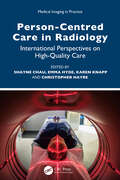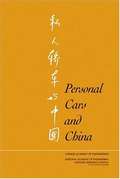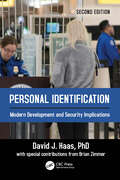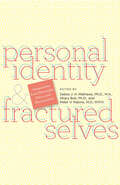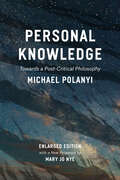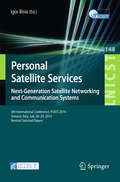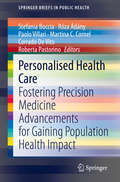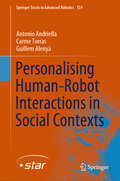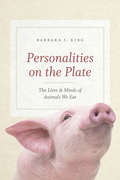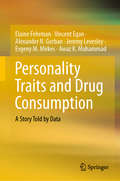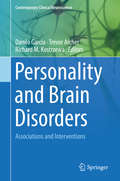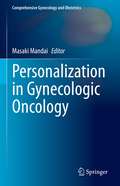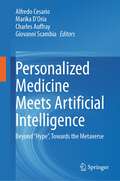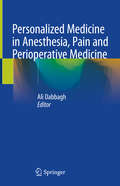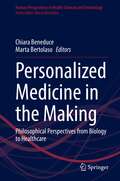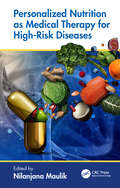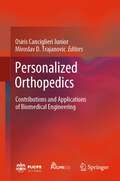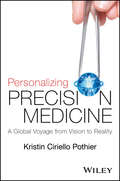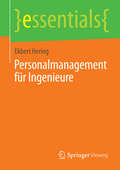- Table View
- List View
Person-Centered Studies in Psychology of Science: Examining the Active Person
by Stephen L. Antczak Lisa M OsbeckThis unique collection examines "the acting person" as an important unit of analysis for science studies, using an integrative approach of in-depth case studies to explore the cognitive, social, cultural, and personal dimensions of a series of key figures in the sciences, from Goethe to Kepler to Rachel Carson. Opening up key questions about what science is, and what comprises a scientist, the volume offers an accessible introductory approach to psychology of science, a growing area in Science and Technology Studies (STS). Case studies focus on the psychological contexts of the contributions for which the scientist is known. Without diminishing its epistemic authority, science is presented as a psychologically saturated human activity, one that is especially illustrative of the way social, cognitive, and personal processes intermingle to both facilitate and impede scientific accomplishment. Each case study ends with a set of discussion questions, providing a valuable resource for student reflection and discussion, inviting analysis of similarities and differences in science in the context of very different lives and different projects. Person-Centered Studies in Psychology of Science is essential reading for scholars and graduates interested in the psychology of science, personality theory, social, or cognitive psychology, general psychologists, and theoretical psychologists.
Person-Centred Care in Radiology: International Perspectives on High-Quality Care (Medical Imaging in Practice)
by Karen Knapp Christopher Hayre Emma Hyde Chau, Edited by ShayneThis edited book focuses on the application of patient care within the three specialisms: diagnostic radiography (including fluoroscopy, computed tomography, breast imaging, ultrasound, and magnetic resonance imaging), radiotherapy and oncology, and nuclear medicine and molecular imaging.Person-Centred Care in Radiology: International Perspectives on High-Quality Care draws from recent publications and clinical expertise, supported with this trend of technological advances and how they are supposed to enhance patient care. The chapters seek to uncover the role and behavior of radiographers. This will be supported with chapters on a key aspect, which will impact both radiographers and patients, vis-à-vis advancing technology. These chapters include topics such as artificial intelligence, image acquisition, coincided with topics surrounding ethics. The edited volume includes contributions from the United States, Canada, the UK and Australasia to bring together for the first time those at the forefront of this growing field in medical imaging.This book may be used to influence policymaking decisions and thus influence how healthcare delivery is offered in an ever-evolving imaging environment. In short, this text bridges the gap between what is advocated in the literature, with experience, as observed in practice. The targeted audience for this book is multifaceted. It will primarily be a book that facilitates undergraduate radiography students worldwide. It will offer a useful tool for academics delivering undergraduate (pre-registration) radiography programs.This book will act as a ‘primer’ for undergraduate students, but importantly ‘signpost’ to other key texts within the field. Further, academics will find this text useful as it aims to enrich scholarly learning, teaching and assessment to healthcare programs nationally and internationally.
Personal Cars and China
by Zhongguo Gong Cheng Yuan Staff National Research Council (U.S.) StaffThis collaborative study between the NRC and the Chinese Academy of Engineering (CAE) addresses the problems facing China in the next twenty years as it attempts to provide personal transport desired by millions of Chinese, while preserving the environment and the livability of its cities. According to Song Jian, president of the CAE, the decision has already been taken to produce a moderate cost family car in China, which will greatly increase the number of vehicles on the roads. This study explores the issues confronting the country, including health issues, the challenge to urban areas, particularly the growing number of megacities, environmental protection, infrastructure requirements, and technological options for Chinese vehicles. It draws on the experience of the United States and other countries and review model approaches to urban transportation and land use planning. Recommendations and policy choices for China are described in detail.
Personal Comfort Systems for Improving Indoor Thermal Comfort and Air Quality (Indoor Environment and Sustainable Building)
by Bin Yang Faming Wang Maohui Luo Qihong DengThis book first describes fundamental knowledge on human thermal comfort, adaptive thermal comfort, thermal comfort in sleeping environments, modeling of human thermal comfort, and thermal comfort assessment using human trials. Next, it presents an in-depth review of concept progress and evaluation of various personal comfort system, summarizes important findings and feasible applications, current gaps as well as future research needs. The seven chapters included in this section are task/ambient conditioning systems, personalized ventilation systems, electric fans, personal comfort systems, thermoelectric systems, personal thermal management systems, and wearable personal thermal comfort systems. This book provides valuable guidance for personal comfort system design and further improvement on the personal comfort performance. It will be a valuable resource for academic researchers, engineers in industry, and government regulators in the field of sustainable buildings and built environment.
Personal Data in Competition, Consumer Protection and Intellectual Property Law: Towards A Holistic Approach? (Mpi Studies On Intellectual Property And Competition Law Ser. #28)
by Mor Bakhoum Beatriz Conde Gallego Mark-Oliver Mackenrodt Gintarė Surblytė-NamavičienėThis book analyses the legal approach to personal data taken by different fields of law. An increasing number of business models in the digital economy rely on personal data as a key input. In exchange for sharing their data, online users benefit from personalized and innovative services. But companies’ collection and use of personal data raise questions about privacy and fundamental rights. Moreover, given the substantial commercial and strategic value of personal data, their accumulation, control and use may raise competition concerns and negatively affect consumers. To establish a legal framework that ensures an adequate level of protection of personal data while at the same time providing an open and level playing field for businesses to develop innovative data-based services is a challenging task.With this objective in mind and against the background of the uniform rules set by the EU General Data Protection Regulation, the contributions to this book examine the significance and legal treatment of personal data in competition law, consumer protection law, general civil law and intellectual property law. Instead of providing an isolated analysis of the different areas of law, the book focuses on both synergies and tensions between the different legal fields, exploring potential ways to develop an integrated legal approach to personal data.
Personal Identification: Modern Development and Security Implications
by David J. HaasPersonal Identification: Modern Development and Security Implications, Second Edition explains how personal identification – and REAL ID – became part of the American fabric along with their past century’s historical ID development. The development of the “trusted and secure” personal identification documents began with passports and has continued as social changes made IDs more essential. This book describes the convergence of technologies and hundreds of patents that produced our “trusted and secure” documents and IDs from our past right up through to today.Key factors, that created today’s need for public-issued mass ID, are addressed: Chronicles the effects of large and mobile populations beginning a century ago Chronicles the effects of “impersonal” electronic & computer communications at a distance, and not face-to-face The distribution of services and money by government agencies based on a person’s identity – including “age” and “group” criteria Describes recent national security and terrorism concerns that necessitates the need to know: “You are who you say you are.” Personal identification documents (IDs) and the societal need for “trusted” identification by the public is a relatively new social phenomenon. In 1900, most people did not need or have any IDs until passports, with a photograph of the individual, became mandatory when Great Britain entered World War I in 1914. In the United States, the State-issued driver’s license is probably the only trusted ID in one’s wallet today, but they became “trusted and secure” documents only recently with the requirement for REAL ID. With the first photo driver’s license issued by the State of Colorado in 1959, it took until 1984 for the last State (New York, 25 years later) to comply.As a direct result of 9/11, where terrorists used fake driver’s licenses to board planes, Congress passed the Real ID Act in 2005 to make all State-issued driver’s licenses more trusted, uniform, and tamper-resistant – what is now called the Enhanced Driver’s License with non-drivers being issued Enhanced Identification Cards. And with this, every US citizen can now possess a trusted and secure personal identification document.Personal Identification, Second Edition chronicles the path of personal identification measures – including the latest developments of Real ID. Scholars and professional security managers understand that stability, security, and safety necessitate these identity measures to ensure a safer America. The book explains the various stages and advances, providing readers with a unique study of this fascinating history of the relationship between identity and the means by which one validates and proves their own identity. The enactment of the REAL ID Act of 2005, with more secure and tamper-resistant documents for each citizen of the United States, is being instituted so that one can trust: “you are who you say you are.” The State-issued driver’s license is not a National ID Card – it is a Nationally Recognized ID for each citizen.
Personal Identity & Fractured Selves: Perspectives from Philosophy, Ethics, and Neuroscience
by Debra J. H. Mathews, Hilary Bok, and Peter V. RabinsIn this anthology, noted neurologists and philosophers explore the concept of personal identity and the ethics of treating brain disease and injury.When an individual’s personality changes radically because of disease or injury, should this changed individual be treated as the same person? Personal Identity and Fractured Selves explores this important question from a variety of perspectives. Its contents represent the first formal collaboration between the Brain Sciences Institute and the Berman Institute of Bioethics, both at the Johns Hopkins University.Rapid advances in brain science are expanding knowledge of human memory, emotion, and cognition and pointing the way toward new approaches for the prevention and treatment of devastating illnesses and disabilities. Through case studies of Alzheimer disease, frontotemporal dementia, deep brain stimulation, and steroid psychosis, the contributors highlight relevant ethical and social concerns that clinicians, researchers, and ethicists are likely to encounter.Contributors: Samuel Barondes, M.D., University of California, San Francisco; David M. Blass, M.D., Johns Hopkins University School of Medicine; Patrick Duggan, A.B., Johns Hopkins Berman Institute of Bioethics; Ruth R. Faden, Ph.D., M.P.H., Johns Hopkins Berman Institute of Bioethics; Michael S. Gazzaniga, Ph.D., University of California, Santa Barbara; Guy M. McKhann, M.D., Johns Hopkins University School of Medicine; John Perry, Ph.D., Stanford University; Carol Rovane, Ph.D., Columbia University; Alan Regenberg, M.Be., Johns Hopkins Berman Institute of Bioethics; Marya Schechtman, Ph.D., University of Illinois at Chicago; Maura Tumulty, Ph.D., Colgate University
Personal Identity and Fractured Selves: Perspectives from Philosophy, Ethics, and Neuroscience
by Debra J. H. Mathews, Hilary Bok, and Peter V. RabinsThis book brings together some of the best minds in neurology and philosophy to discuss the concept of personal identity and the moral dimensions of treating brain disease and injury. The contributors engage a crucial question: When an individual’s personality changes radically because of disease or injury, should this changed individual be treated as the same person?Rapid advances in brain science are expanding knowledge of human memory, emotion, and cognition and pointing the way toward new approaches for the prevention and treatment of devastating illnesses and disabilities. Through case studies of Alzheimer disease, frontotemporal dementia, deep brain stimulation, and steroid psychosis, the contributors highlight relevant ethical and social concerns that clinicians, researchers, and ethicists are likely to encounter. Personal Identity and Fractured Selves represents the first formal collaboration between the Brain Sciences Institute and the Berman Institute of Bioethics, both at the Johns Hopkins University. The book asks neuroscientists and philosophers to address important questions on the topic of personal identity in an effort to engage both fields in fruitful conversation. Contributors: Samuel Barondes, M.D., University of California, San Francisco; David M. Blass, M.D., Johns Hopkins University School of Medicine; Patrick Duggan, A.B., Johns Hopkins Berman Institute of Bioethics; Ruth R. Faden, Ph.D., M.P.H., Johns Hopkins Berman Institute of Bioethics; Michael S. Gazzaniga, Ph.D., University of California, Santa Barbara; Guy M. McKhann, M.D., Johns Hopkins University School of Medicine; John Perry, Ph.D., Stanford University; Carol Rovane, Ph.D., Columbia University; Alan Regenberg, M.Be., Johns Hopkins Berman Institute of Bioethics; Marya Schechtman, Ph.D., University of Illinois at Chicago; Maura Tumulty, Ph.D., Colgate University
Personal Knowledge: Towards a Post-Critical Philosophy
by Michael Polanyi Mary Jo NyeThe publication of Personal Knowledge in 1958 shook the science world, as Michael Polanyi took aim at the long-standing ideals of rigid empiricism and rule-bound logic. Today, Personal Knowledge remains one of the most significant philosophy of science books of the twentieth century, bringing the crucial concepts of "tacit knowledge" and "personal knowledge" to the forefront of inquiry. In this remarkable treatise, Polanyi attests that our personal experiences and ways of sharing knowledge have a profound effect on scientific discovery. He argues against the idea of the wholly dispassionate researcher, pointing out that even in the strictest of sciences, knowing is still an art, and that personal commitment and passion are logically necessary parts of research. In our technological age where fact is split from value and science from humanity, Polanyi's work continues to advocate for the innate curiosity and scientific leaps of faith that drive our most dazzling ingenuity. For this expanded edition, Polyani scholar Mary Jo Nye set the philosopher-scientist's work into contemporary context, offering fresh insights and providing a helpful guide to critical terms in the work. Used in fields as diverse as religious studies, chemistry, economics, and anthropology, Polanyi's view of knowledge creation is just as relevant to intellectual endeavors today as when it first made waves more than fifty years ago.
Personal Satellite Services. Next-Generation Satellite Networking and Communication Systems
by Igor BisioThis book constitutes the refereed post-conference proceedings of the 6th International Conference on Personal Satellite Services, PSATS 2014, held in Genova, Italy, in July 2014. The 10 revised full papers presented were carefully reviewed and present the latest advances in the next generation satellite networking and communication systems.
Personal Security: A Guide for International Travelers
by Tanya SpencerMaintain peace of mind while you are working or living abroad wherever and however you travel. As an international traveler, you know there are risks. But are you doing everything you can to protect yourself and your belongings? Whether you are traveling for work or pleasure, Personal Security: A Guide for International Travelers enables you to pre
Personalised Health Care: Fostering Precision Medicine Advancements for Gaining Population Health Impact (SpringerBriefs in Public Health)
by Stefania Boccia Paolo Villari Róza Ádány Martina C. Cornel Corrado De Vito Roberta PastorinoPractitioners are increasingly adopting a personalised medicine approach to individually tailored patient care, especially disease diagnosis and treatment with the use of biomarkers. However, development and implementation of such approaches to chronic disease prevention need further investigation and concerted efforts for proper use in healthcare systems. This book provides high-quality, multidisciplinary knowledge from research in personalised medicine, specifically personalised prevention of chronic disease. It addresses different perspectives of prevention in the field, and is the outcome of a four-year work of the Personalized prevention of Chronic Disease (PRECeDI) Consortium, a multi-disciplinary and multi-professional team of experts. The Consortium jointly agreed to document and address the five aspects or domains of personalised medicine and prevention as individual chapters: Identification of biomarkers for the prevention of chronic diseaseEvaluation of predictive genomic applicationsEthico-legal and policy issues surrounding personalised medicineRoles and responsibilities of stakeholders in informing healthy individuals on their genome: a sociotechnical analysisIdentification of organisational models for the provision of predictive genomic applicationsThe book focuses on the Consortium's recommendations that are derived from each of these domains based on up-to-date evidence and research that the authors write, follow, and systematically organise and report.Personalisation of health care is, eventually, a driver of innovation in research and healthcare systems. With this SpringerBrief on Personalised Health Care: Fostering Precision Medicine Advancements for Gaining Population Health Impact, the Consortium provides further evidence of the clinical validity and utility of personalised medicine with special emphasis on the prevention of chronic diseases. The book is a useful resource for policy makers, industry and healthcare professionals, scientists, technology-sector professionals, investors, citizens, and private companies that need proper advice to realise the potential of personalised medicine.
Personalising Human-Robot Interactions in Social Contexts (Springer Tracts in Advanced Robotics #159)
by Carme Torras Antonio Andriella Guillem AlenyàThis book offers an insightful exploration of the pivotal role of robots in our ever-changing society. As intelligent machines become increasingly integrated into various aspects of our lives, their impact on how we live, work, and interact becomes undeniable. Within these pages, the book delves into the key concept of personalisation, unravelling the profound importance of tailoring robotic interactions to meet the unique needs and preferences of individuals. This exploration seeks to foster a deeper understanding of how robots can enhance our lives and potentially be a worthwhile technology to address some important societal issues. To showcase that, the book centres on a practical use case that is built upon collaboration with healthcare experts: designing personalised robots for assisting patients affected by cognitive decline. With over 50 million people affected by dementia worldwide and an expected tripling of this number by 2050, the need for effective and accessible treatments is more pressing than ever. While there are no pharmacological treatments for this syndrome, cognitive training has shown promise for maintaining and even improving cognitive functioning among dementia patients. However, the shortage of healthcare professionals capable of delivering such therapy presents a significant challenge. This is where the potential of robots comes into play. This book delves into the potential of robotic technology designed to bridge this societal gap. By taking a therapist-oriented approach, it investigates the insights that can be gleaned from involving therapists in the entire pipeline of the design process as well as in the automatisation of the robots' assistive behaviour. Specifically, this book aims to address personalisation from two complementary perspectives by designing robots that are both adaptable and adaptive.
Personalities on the Plate: The Lives & Minds of Animals We Eat
by Barbara J. KingIn recent years, scientific advances in our understanding of animal minds have led to major changes in how we think about, and treat, animals in zoos and aquariums. The general public, it seems, is slowly coming to understand that animals like apes, elephants, and dolphins have not just brains, but complicated inner and social lives, and that we need to act accordingly. Yet that realization hasn’t yet made its presence felt to any great degree in our most intimate relationship with animals: at the dinner table. Sure, there are vegetarians and vegans all over, but at the same time, meat consumption is up, and meat remains a central part of the culinary and dining experience for the majority of people in the developed world. With Personalities on the Plate, Barbara King asks us to think hard about our meat eating--and how we might reduce it. But this isn’t a polemic intended to convert readers to veganism. What she is interested in is why we’ve not drawn food animals into our concern and just what we do know about the minds and lives of chickens, cows, octopuses, fish, and more. Rooted in the latest science, and built on a mix of firsthand experience (including entomophagy, which, yes, is what you think it is) and close engagement with the work of scientists, farmers, vets, and chefs, Personalities on the Plate is an unforgettable journey through the world of animals we eat. Knowing what we know--and what we may yet learn--what is the proper ethical stance toward eating meat? What are the consequences for the planet? How can we life an ethically and ecologically sound life through our food choices? We could have no better guide to these fascinatingly thorny questions than King, whose deep empathy embraces human and animal alike. Readers will be moved, provoked, and changed by this powerful book.
Personality Traits and Drug Consumption: A Story Told by Data (SpringerBriefs in Statistics)
by Alexander N. Gorban Jeremy Levesley Elaine Fehrman Vincent Egan Evgeny M. Mirkes Awaz K. MuhammadThis book discusses the psychological traits associated with drug consumption through the statistical analysis of a new database with information on 1885 respondents and use of 18 drugs. After reviewing published works on the psychological profiles of drug users and describing the data mining and machine learning methods used, it demonstrates that the personality traits (five factor model, impulsivity, and sensation seeking) together with simple demographic data make it possible to predict the risk of consumption of individual drugs with a sensitivity and specificity above 70% for most drugs. It also analyzes the correlations of use of different substances and describes the groups of drugs with correlated use, identifying significant differences in personality profiles for users of different drugs. The book is intended for advanced undergraduates and first-year PhD students, as well as researchers and practitioners. Although no previous knowledge of machine learning, advanced data mining concepts or modern psychology of personality is assumed, familiarity with basic statistics and some experience in the use of probabilities would be helpful. For a more detailed introduction to statistical methods, the book provides recommendations for undergraduate textbooks.
Personality and Brain Disorders: Associations and Interventions (Contemporary Clinical Neuroscience)
by Richard M. Kostrzewa Trevor Archer Danilo GarciaBrain disorders (neurodevelopmental, neurodegenerative, and affective disorders) can be investigated, treated, and prevented using person-centered methods. Because researchers have not reached a clear consensus on whether or not personality is stable or changeable, it has been difficult to outline how to use these methods in the care of people with brain disorders. Thus, the first part aims to identify the ways in which brain disorders and personality are linked. The second part explores different person-centered approaches that can be incorporated in a healthcare or education setting to help people with various brain disorders and to promote physical, mental and social health. The third part focuses on challenges and new venues.
Personality and Temperament in Nonhuman Primates
by Alexander Weiss James E. King Lindsay MurrayRecently, there has been an increased interest in research on personality, temperament, and behavioral syndromes (henceforth to be referred to as personality) in nonhuman primates and other animals. This follows, in part, from a general interest in the subject matter and the realization that individual differences, once consigned to 'error' terms in statistical analyses, are potentially important predictors, moderators, and mediators of a wide variety of outcomes ranging from the results of experiments to health to enrichment programs. Unfortunately, while there is a burgeoning interest in the subject matter, findings have been reported in a diverse number of journals and most of the methodological and statistical approaches were developed in research on human personality. The proposed volume seeks to gather submissions from a variety of specialists in research on individual differences in primate temperament, personality, or behavioral syndromes. We anticipate that chapters will cover several areas. The first part of this edited volume will focus on methodological considerations including the advantages and disadvantages of different means of assessing these constructs in primates and introduce some statistical approaches that have typically been the domain of human personality research. Another part of this edited volume will focus on present findings including the physiological and genetic bases of personality dimensions in primates; the relationship between personality and age; how personality may moderate or impact various outcomes including behavior, health, and well-being in captive and non-captive environments. For the third part of the volume we hope to obtain summaries of the existing work of the authors on the evolutionary important of personality dimensions and guideposts for future directions in this new and exciting area of research.
Personalization in Gynecologic Oncology (Comprehensive Gynecology and Obstetrics)
by Masaki MandaiThis book thoroughly illustrates the designed and tailored medical approaches for tumors of the female reproductive organ. The chapters explore different cancer species such as ovarian cancer, endometrial cancer, cervical cancer, etc. Various treatment modalities such as immunotherapy and histotype-specific treatment are delivered, and it offers a chapter on how genome-wide analysis contributes to personalized treatment. It is essential to understand this concept because many molecular target drugs and the prevalence of genome-based analysis in clinical settings have enabled us to introduce valid precision medicine in the field of gynecologic oncology. Chapters explain the stream of transition from conventional standardized treatment to personalized treatment and address future perspectives.Personalization Gynecologic Oncology is a well-designed source for beginning to advanced oncologists, gynecologists, geneticists, genetic counselors, and nurses. Offering the latest treatment strategies, the Editor hopes the ideas presented here will be a foundation for further development in the field.
Personalized Medicine Meets Artificial Intelligence: Beyond “Hype”, Towards the Metaverse
by Alfredo Cesario Marika D’Oria Charles Auffray Giovanni ScambiaThe book provides a multidisciplinary outlook on using Artificial Intelligence (AI)-based solutions in the field of Personalized Medicine and its transitioning towards Personalized Digital Medicine.The first section integrates different perspectives on AI-based solutions and highlights their potential in biomedical research and patient care. In the second section, the authors present several real-world examples that demonstrate the successful use of AI technologies in various contexts. These include examples from digital therapeutics, in silico clinical trials, and network pharmacology. In the final section of the book, the authors explore future directions in AI-enhanced biomedical technologies and discuss emerging technologies such as blockchain, quantum computing and the “metaverse”. The book includes discussions on the ethical, regulatory, and social implications for an AI-based personalized medicine. The integration of heterogeneous disciplines brings together multiple stakeholders and decision makers involved in the personalization of care. Clinicians, students, and researchers from academia and the industry can benefit from this book, since it provides foundational knowledge to drive advances in personalized biomedical research and health care.
Personalized Medicine in Anesthesia, Pain and Perioperative Medicine
by Ali DabbaghThis book discusses the current and future impact of cellular and molecular medicine (CMM) on anesthesiology and perioperative medicine. It covers the topic from a translational perspective and describes the relevance of CMM to daily clinical practice. Taking a bench-to-bedside approach, chapters examine topics including perioperative acute and chronic management, perioperative organ protection, and novel pharmaceuticals. Personalized Medicine in Anesthesia, Pain and Perioperative Medicine is aimed at anesthesiologists and pain physicians, and will also be of interest to pharmacists and those working in cellular and molecular medicine.
Personalized Medicine in the Making: Philosophical Perspectives from Biology to Healthcare (Human Perspectives in Health Sciences and Technology #3)
by Marta Bertolaso Chiara BeneduceThis book offers a multidisciplinary look at the much-debated concept of “personalized medicine”. By combining a humanistic and a scientific approach, the book builds up a multidimensional way to understand the limits and potentialities of a personalized approach in medicine and healthcare. The book reflects on personalized medicine and complex diseases, the relationship between personalized medicine and the new bio-technologies, personalized medicine and personalized nutrition, and on some ethical, political, economic, and social implications of personalized medicine. This volume is of interest to researchers from several disciplines including philosophy, bio-medicine, and the social sciences.
Personalized Nutrition as Medical Therapy for High-Risk Diseases
by Nilanjana MaulikPersonalized nutrition involves the formulation of individualized nutritional recommendations to promote and maintain health based on an individual's genetic makeup and other unique intrinsic and extrinsic factors. Implementing personalized nutrition plans for individuals with certain diseases or who are in danger of developing health conditions could help control the onset and severity of symptoms. Personalized Nutrition as Medical Therapy for High-Risk Diseases offers a practical guide for physicians seeking to provide tailored dietary recommendations to their patients with disease treatment, modulation and prevention in mind. The book focuses on the biological mechanisms of specific diseases and provides evidence for how personalized nutrition positively impacts them. It explores conditions including cardiovascular diseases, hypertension, hypercholesteromia, diabetes, obesity, Crohn's disease, as well as multiple pediatric, renal and psychological disorders. Features: · Includes case studies that document how people respond differently towards food depending on their genetic structure and other factors. · Discusses genome wide association studies (GWIMS) to understand the interplay between genetic susceptibility and dietary interactions. · Provides users information to effectively implement personalized nutrition into practice. · Identifies possible challenges to the implementation of personalized nutritional interventions in a clinical setting. This book is for medical practitioners and will also appeal to researchers and students.
Personalized Orthopedics: Contributions and Applications of Biomedical Engineering
by Osiris Canciglieri Junior Miroslav D. TrajanovicThis book covers the most important topics in the field of personalized orthopedics. It starts with the 3D geometry of the bones, focusing on the problem of reverse engineering of the bones. It also shows the application of a 3D geometric model of bone for the design of personalized implants and prostheses. This book covers the application of additive technologies in personalized orthopedics as well as prediction, simulation and optimization in personalized orthopedics. Its content provides the necessary knowledge for the transition from classical to personalized orthopedics. The authors present an original method for reverse bone engineering—the Method of Anatomical Features (MAF). This method is unique as it enables the reconstruction of the original geometry and topology of the bone, even when only data on its part are available. The application of this method is shown on the examples of human long bones, mandible and hip bone reconstruction. This book contains a review of several real cases of personalized implants. It gives several examples of prostheses for the design of which a 3D model of bones was used, as well as other patient data on the basis of which personalized prostheses were designed.
Personalizing Precision Medicine: A Global Voyage from Vision to Reality
by Kristin Ciriello PothierThe author uses decades of experience and interviews with experts in precision medicine to explain past, present, and future of precision medicine. She reviews the full continuum of personalizing precision medicine, including diagnostics, therapeutics, big data, supportive care, regulation, and reimbursement and innovation in precision medicine worldwide.• Combines a unique cross section of history, current technologies, and future directions for how precision medicine has and will affect people worldwide• Reviews precision medicine around the world, including the US, China, Japan, the Middle East, India, Europe, and Latin America• Discusses a number of diseases areas – cancer, cardiovascular, neurodegenerative, infectious disease, pain, immunology, rare diseases• Includes information and quotes from over 100 interviews with key industry experts in biotech, pharma, informatics, diagnostics, health providers, advocacy groups, and more.• Includes stories illustrating current issues and future promises in precision medicine for a human touch
Personalmanagement für Ingenieure (essentials)
by Ekbert HeringMitarbeiter sind die wichtigste Ressource eines Unternehmens. Geeignetes Personal zu finden und an das Unternehmen zu binden, gehört daher zu den wichtigsten und erfolgsentscheidenden Aufgaben im Unternehmen. Gerade Ingenieure übernehmen im Laufe ihrer Karriere immer mehr Personalverantwortung. Deshalb sind die Kenntnisse über Personalmanagement für Ingenieure sehr wichtig. Im Mittelpunkt steht dabei die Persönlichkeit eines Menschen. Anhand des Verhaltensmodells nach persolog® werden verschiedene Persönlichkeitsprofile aufgezeigt sowie deren Stärken und Schwächen vorgestellt (beispielsweise für Konstrukteure oder Innovatoren). Wichtig ist dabei, dass die Mitarbeiter entsprechend ihren Stärken richtig eingesetzt werden. Ausführlich werden die Methoden der Personalfindung, der Personalbindung, der Mitarbeiterbeurteilung und Entlohnung sowie der Personaltrennung behandelt.

